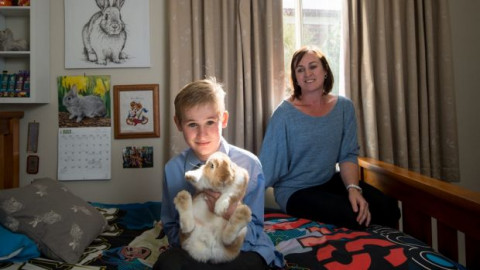
Desperate parents are shopping for a label for their children's disability in a bid to secure vital classroom support.
In order to satisfy rigid funding rules, parents of students with high-functioning autism and attention deficit hyperactivity disorder are seeking a diagnosis of severe behaviour disorder.
Psychiatrists say the latter is a label that applies to students who cause intolerable disturbances in class.
The state government's disability program does not fund students with ADHD, and students with high-functioning autism often struggle to access government-funded integration aides, equipment and other support because they perform too well on the language component of the eligibility test.
The state government's disability program does not fund students with ADHD. Photo: Virginia Star
When Jack Baulch started year 7 last year he was denied access to aides who had helped him throughout primary school, after he scored high on the language test.
Jack, 13, who has high-functioning autism and ADHD, was suspended seven times in his first year of secondary school for disobeying teachers' instructions, disrupting class, and running out of the classroom.
"I was so desperate to get Jack funding, that I was willing to do whatever it took," said his mother, Katrina Baulch.
Ms Baulch told her son's psychologist that Jack lost his funding for autism. The psychologist submitted a report to the Victorian Education Department requesting that he be funded for severe behaviour disorder.
"That got him over the line," said Ms Baulch.
Parents like Ms Baulch point to federal government data showing that fewer than half of the 469,000 Australian students who have a disability or learning difficulty are receiving funding.
This week Fairfax Media also revealed that students with disabilities are being excluded from school camps and excursions and told they are too disruptive.
The number of students receiving funding for severe behaviour disorder has been steadily rising in Victoria, jumping by 26 per cent between 2011 and 2015. There was a 40 per cent increase over the four years before that.
Ms Baulch said her son's psychologist did not lie, as Jack's oppositional behaviour could be linked to severe behaviour disorder. But "99.9 per cent" of the boy's behaviour was clearly explained by autism.
She was "annoyed" that she had hunt for yet another label to secure funding for his education.
"These conditions are supposed to be lifelong diagnoses, they stick with a child for ever," she said.
Another parent, Gina*, said that several years ago she felt forced to lie about her son's disability so he could keep his place at a special school, where he was enrolled throughout primary.
When her son underwent a mandatory re-evaluation of his funding eligibility in grade six, he lost his funding and access to his special school.
Like Jack, the boy has high-functioning autism, so he performed well on language tests.
But the boy, who often yelled and thrashed out in class, or otherwise withdrew and stopped speaking altogether, was asked to go to a mainstream school without any support.
"The school said there is another way we can do it and they explained on paper he would be listed as having a severe behaviour disorder and that was the only way to keep his funding."
So Gina asked her psychiatrist to tell the department that his behaviour was "over and above autism". The psychiatrist did.
"It annoyed me that I had to do that," Gina said. "I had to go and say he had something he didn't necessarily have."
A recent state government review of disability funding acknowledged that "a number of students" with autism do not meet the eligibility criteria, often due to strong language skills, and called for additional resources to support these students.
Dr Paul Robertson, the Victorian director of child and adolescent psychiatry at the Royal Australian and New Zealand College of Psychiatrists, often writes reports on students' behalf requesting special needs funding, but said he has never manipulated a students' diagnosis.
He said he was concerned that this would misdirect classroom resources, and cause confusion within the school about the student's needs.
"An accurate diagnosis of a disability is very important for the school because there are resources, training and strategies that are specific for things like having autism spectrum disorder or learning difficulties," he said.
Dr Robertson said he was concerned that the current funding program was "inequitable and unfair" as it overlooked many disabilities.
"If you cause trouble in the classroom, you're more likely to get support. Funding should be based on the students' needs, not on whether they cause us a problem or not."
An Education Department spokesman said disability funding was "one of a range of resources available to schools to support students with disabilities with high needs".
A recently expanded Language and Learning Disabilities Support program provides extra funding for students with speech and language disabilities, autism and dyslexia.
Teachers must now undertake professional learning on teaching students with disabilities as a condition of registration.
Gina* is not her real name